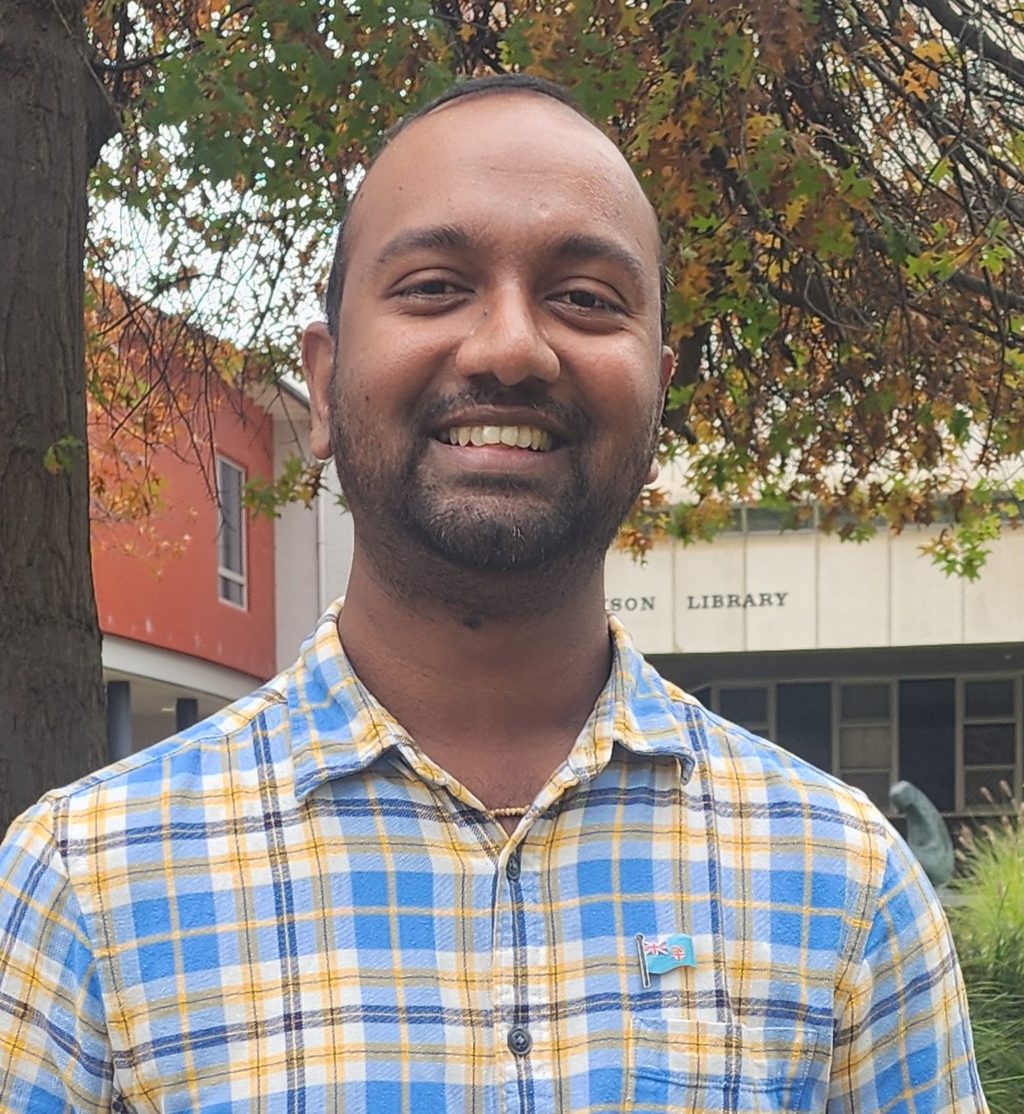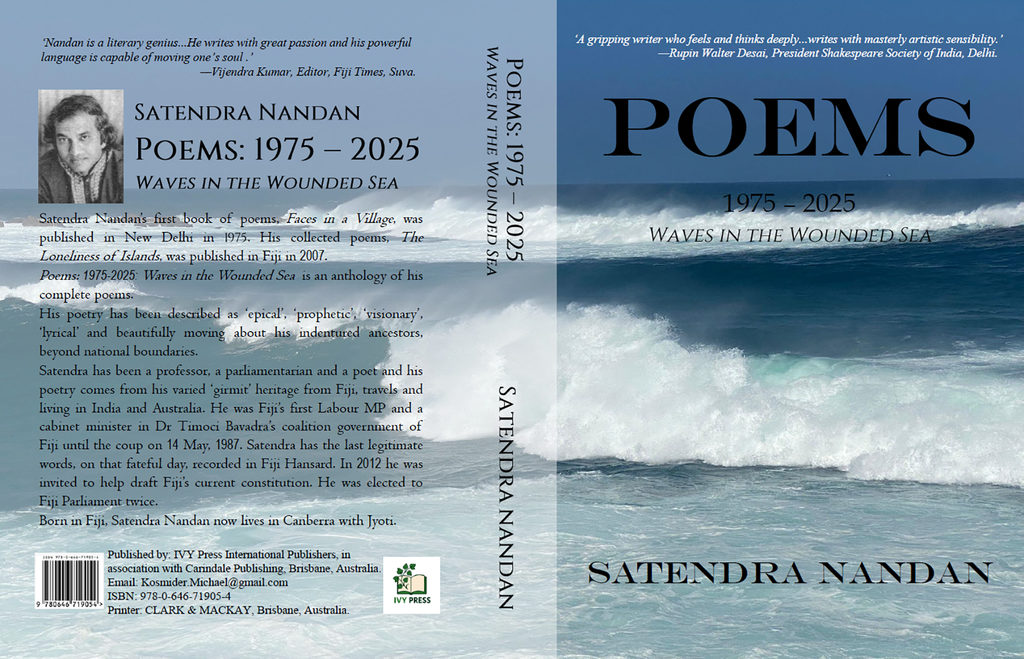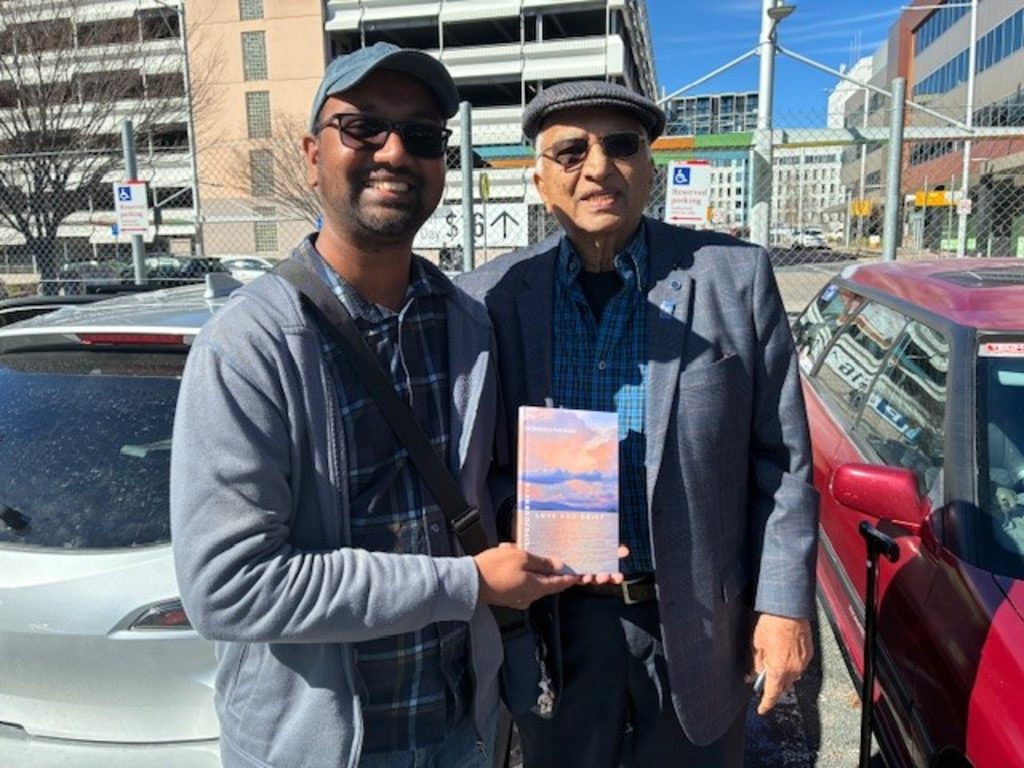During a recent trip to New Castle, NSW, I stumbled upon a second-hand book shop on the main street in Hamilton.
The bookshop had new, second hand, and a rare collection of books. Amongst piles and endless shelves of books, I found the complete works of poetry by William Wordsworth, TS Eliot, WB Yates, and a personal favourite Robert Frost.
Their poetry has been published in different places but having a collection of completed works makes it readily accessible for a reader to have almost every work written by the poet.
Satendra Nandan’s latest book POEMS – 1975-2025: Waves in the Wounded Sea, is the first volume of its kind by a Fijian-Australasian writer of the Indian indenture heritage. It is his complete works of poetry spanning five decades of being a literary mastermind! Nandan’s ability to connect words and emotions to real situations is utterly unimaginable. He does it with such ease and eloquence, while gripping the reader’s attention profusely.
THIS monumental volume of over 200 poems captured in 600 pages is the legacy of Nandan’s five decades of active creative practice.
Makes one wonder, can there be another of his stature? Without any objections, he is to be recognised as the Father of Fiji poetry.
His writing is his gift to the world but when you observe closely, actually he is Fiji’s gift to the world.
The foreword of the book written by former Professor of English, Harish Trivedi, University of Delhi, beautifully weaves it together for us “Satendra as a person is all of a piece, though his cultural inheritance is fragmented and kaleidoscopic, ranging over Fiji, India, England and Australia. Likewise, his literary versatility comes from the same integrated sensibility. All his books in various genres are cut from the same experiential and imaginative cloth”.
Before you delve into the rich collection of poems, a line that caught my attention in the chapter — origins, the author writes “to be truly human you need a bit of humanity, spiced with humour, with a dash of humility.”
The readers need to acknowledge that these lines come from someone, who has lived an extraordinary life as an author, politician, an academic, a student, and a family man.
To seek his advice on what it means to be a human is simply to empower you on your life’s journey.
His humility emerges in the personal dedications that grace nearly all the poems in the book, extending gratitude to family, friends, fellow scholars, colleagues, and beyond.
Once you get into reading the poems, you are taken in by the feeling of being well acquainted with the themes — the events can seem like déjà vu.
The poem Another Shadow compels you to think of your own grandfather-grandson bond in the days of one’s childhood.
The lines “to take you on the pathless world, on which we’ll all walk, sooner than later” is a reality check for seldom do we ponder upon aging. But it is a fact of life that Nandan alludes the readers to.
Similarly, some of the central themes of the poems relate to the relationship between mother and daughter, father and son, being in love, unspoken journeys, loss and pondering over the past but continuing to live on with hope.
In A Cup of Coffee, the poet takes readers to an overflow of emotions with these lines “Why should the old woman; make you think of your mother? Perhaps somewhere there’s a link …”
Having lost my mother to cancer in 2020, I could easily relate to many incidents that have occurred in the last five years which resonate not only to me but others who have lost their parents.
How many times do we see strangers trying to find our loved ones among those faces?
Two Waves echoes the patriotic sentiments of someone who is proud of their origins and heritage.
This is clearly evident from the opening of the poem “This little village is my second womb, this little island will be my only tomb; that formed-deformed my father’s breath, this is the country of my life and death!”
Nandan, as we know is from the jewel of the South Pacific–Fiji, which he prides upon and is vividly conveyed throughout the book.
In one of the longest poems included in this collection, Votualevu Junction, he gives another example of this “I flew to other shores, fell in love, was exiled by a gun, but still beloved”.
Nandan is an unapologetic writer — I categorically say this because he writes without the fear of being judged for his vocabulary choice.
In Bhola Sadhu, he did not shy away from what exactly ought to be felt “and bought food cheated by many, the sirdars, the shopkeepers, the coolumbers, the native zamindars, many racial prisoners”.
Similarly, in Votualevu Junction, he describes an individual familiar to characters we have encountered in our lives “and stole Gosai mahajan’s oranges, such a rascal — he’d rather let the fruit rot”.
A few lines in the poem Nadi Airport subtly takes a dig at the present generation: “But we grew with our grandparents, Nani cooked: the old were always welcome, the houses were small, but hearts were big, bigger than the oceans”.
The writer compares families in his childhood with how they function today.
For those not familiar with the poet’s background, Nandan helped found the Labour Party of Fiji and was Fiji’s first Labour Member of Parliament — elected to the Fiji Parliament twice: 1982 and 1987.
He was appointed Minister for Health, Social Welfare and Women’s Affairs in the Labour Government of Prime Minister Dr Timoci Bavadra in 1987.
This was short-lived due to the military coup that took place on 14 May 1987. Unhealed scars of this unfortunate moment in his life–Fiji’s history is captured in The Coup: A Day in May “then there were ten of them, masked, they entered the naked parliament”.
The poem creates a vivid picture of how individuals holding the highest office of the land were treated “they pushed us out, loaded us on rusty trucks, guns closed to their cowards’ masked faces”.
The poet goes on in challenging this act, he puts forward apt questions of their behaviour “was this courage or absolute cowardice? Were these warriors? Traitors?” Nandan uses simple words but impactful ones–that depict his bravery as a writer!
The book can be used in several ways apart from reading for pleasure–of course.
English teachers in Fiji high schools can use it in their classrooms and assess various components in the examinations.
There is a great deal of Fiji’s history embedded in these poems whether it relates to grimit days or political upheavals that can be taught in the history classes.
Undergraduate history courses in Fijian universities should pay close attention to the depth and clarity provided in this book such as in Lines Across Black Waters and easily make history more engaging by using poems for assignments.
Beyond Fiji, creative writing and life writing courses can prescribe the book as part of Pacific Literature — works of eminent South Pacific writers.
The illustrious Emeritus Professor Satendra Nandan continues to write books, gives keynotes and supports emerging writers, whilst living a hearty life with his wife Dr Jyoti Nandan.
His dedication to writing can be summed up in a few lines from the poem Stopping by Woods on a Snowy Evening by Robert Frost “but I have promises to keep, and miles to go before I sleep”.
POEMS – 1975-2025: Waves in the Wounded Sea will be launched on Friday 21 November at The Street Theatre in Canberra, Australia.
n DR PRASHNEEL R GOUNDAR is an academic based in New South Wales, Australia. This year he was recognised as an Accredited Linguist by the Australian Linguistic Society. He can be contacted at prgoundar@gmail.com
DR Prashneel

The cover of Satendra Nandan’s latest book POEMS – 1975-2025: Waves in the Wounded Sea. Picture: SUPPLIED



